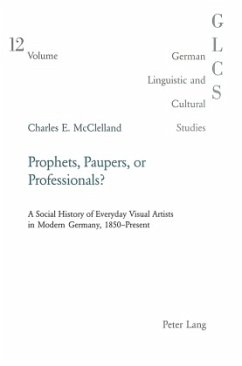How did German visual artists relate to the broader society around them between the invention of the artist as «genius» and visionary, in the Romantic era of the nineteenth century, and the struggle to overcome pauperization and social marginalization through collective professionalization during much of the twentieth? The collective - if not always agreed - aspirations and expectations of artists in this long period are best reflected in the schools and academies that came to dominate their education, in their professional associations, and their strategies of marketing and economic well-being. Like members of other German learned professions, visual artists struggled to achieve autonomy from state, church, and other powerful social and economic forces while also raising and maintaining ever-evolving professional standards. Like other professions, they were forced also to make compromises with power and money, losing many battles in the process. The subjectivity of values surrounding art, the de facto economic status of artists as small entrepreneurs unable or unwilling to submit fully to corporate, bureaucratic, or union organization, and the practical inability to limit their numbers all conspired to undermine fully successful professionalization. By bringing the tools of social history to bear, this book sheds rare illumination on the little-known history of the many «everyday» German artists, rather than on the better-known works of the few.
«Professor McClelland presents a great deal of interesting material based on broad knowledge of the primary and secondary literature, backed by research in a number of archives. His discussion throughout is informed and sophisticated, and his particular perspective, centered but by no means limited to the processes of professionalization, throws a useful light on the complex relationships between tradition and varieties of modernism in German society and the fine arts over the past two centuries.» (Peter Paret, Central European History)
«The book is an excellent survey that will appeal to historians of both Germany and the arts.» (Robin Lenman, Journal of Modern History)
«McClelland's book will become required reading for scholars and graduate students interested in the professionalization process and artists in Germany.» (Joan L. Clinefelter, American Historical Review)
«McClelland's book is an admirable addition to the literature on artists and the art world in Germany.» (Jonathan Osmond, The Art Book)
«The book is an excellent survey that will appeal to historians of both Germany and the arts.» (Robin Lenman, Journal of Modern History)
«McClelland's book will become required reading for scholars and graduate students interested in the professionalization process and artists in Germany.» (Joan L. Clinefelter, American Historical Review)
«McClelland's book is an admirable addition to the literature on artists and the art world in Germany.» (Jonathan Osmond, The Art Book)








